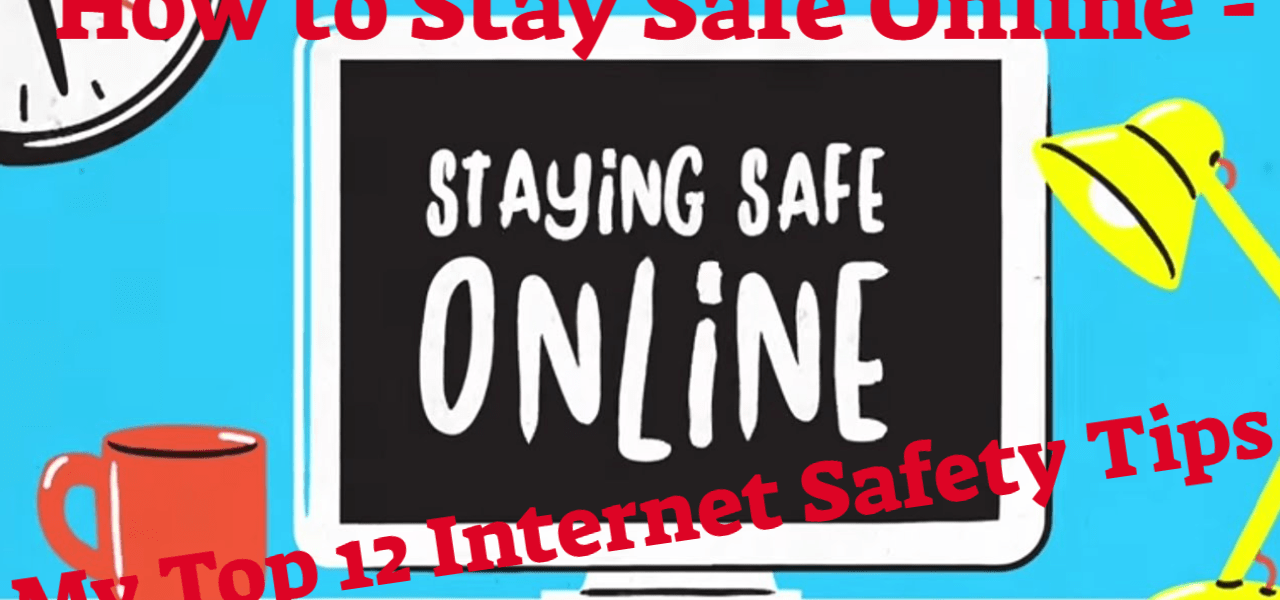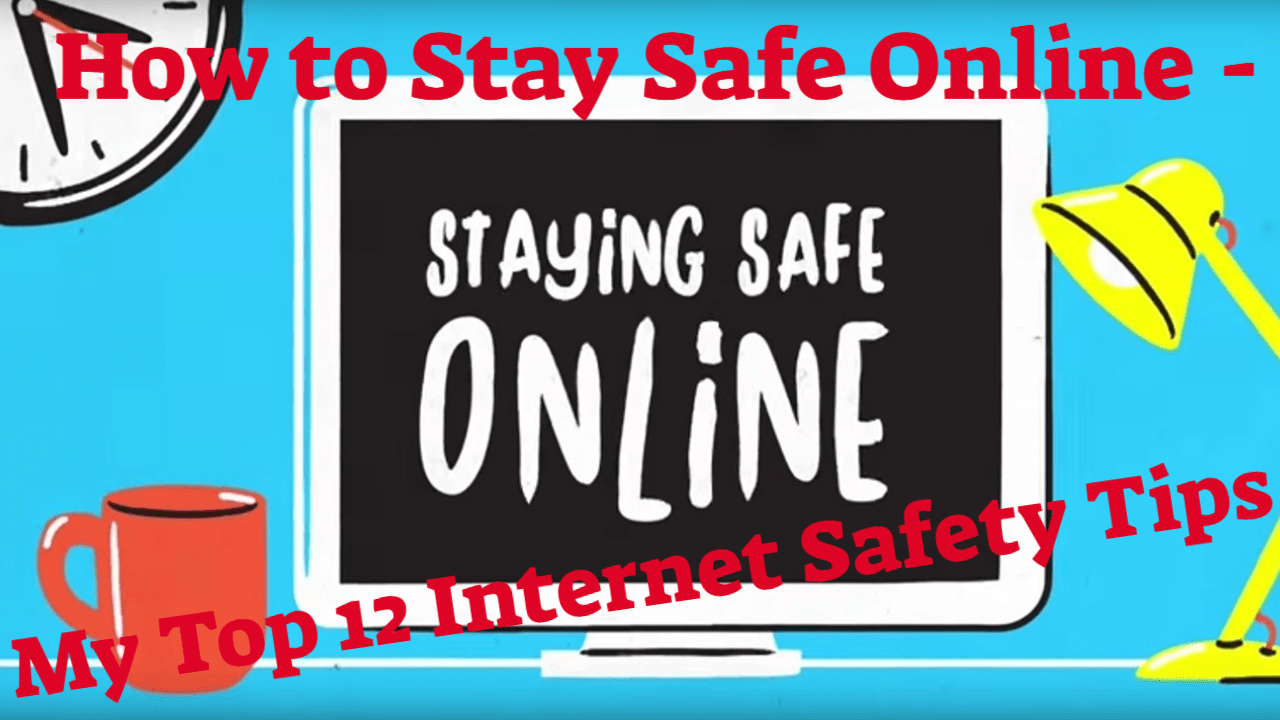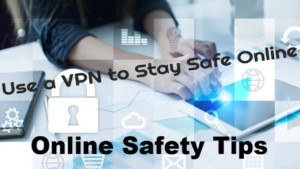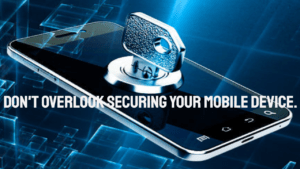
How to Stay Safe Online – My Top 12 Internet Safety Tips
Navigating the Web – How to Stay Safe Online
When considering “how to keep safe online,” one must first consider all of the different ways we utilize the net. Keeping up with current events, banking, shopping, conducting business, listening to music, and keeping in touch with friends and family are all likely on that list.
While greater internet connectivity makes many aspects of our daily lives easier, it also increases our exposure to theft, fraud, and abuse. It’s never been more important to learn how to stay safe online.
With nearly 10 million incidents recorded each year, identity theft is one of America’s fastest-growing crimes. While there is no foolproof means of preventing identity theft, there are several steps we can take to lessen our chances of being victims.
With viruses, hackers, and frauds on the rise, it may look that protecting yourself and your information as safe as possible is impossible, or that there is a financial barrier preventing you from having the protection you desire.
Although many of the tools provided by premium security companies are excellent, you should also examine other options and strategies in your quest to discover ‘how to stay safe online.”
What are the Internet’s Potential Risks?
Cybercriminals and the ever-evolving crimes they commit are among the most common online threats. Because so many cybercrimes are conducted against anyone who uses the internet, no one in your family is likely to be spared. Children, like adults and teenagers, are exposed to a multitude of threats..
Staying safe online necessitates educating the entire family on recognizing and avoiding each cyber hazard. Following are several of the most common online dangers. or potential threats to be aware of:
• Cyberbullying
• Online predators
• Insufficient privacy settings
• Scamming
• Online con artists
• Viruses
• Inappropriate content
• Identity theft
My Top 12 Online Safety Tips
1. Create Passwords that are Both Strong and Unique.
The need to choose strong and unique passwords comes first and foremost in our quest to be safe online.
It’s all too easy to make passwords that are easy to remember by utilizing common words, phrases, or names, but even adding a few capital letters, symbols, or numerals isn’t enough to make your password safe.
Your passwords should not only be unique and challenging to guess, but they should also be different for each account and website you use. Using several passwords is essential because if one account is hacked or a database is breached, you could find yourself in the position of being without access to any of your accounts.
Using this useful LastPass tool, you can reasonably accurately measure your password strength, which can even present you with tips and techniques to help you improve your passwords.
If you’re like me and have a lot of different accounts, using a difficult-to-remember password for each one may be a challenge and a reason you don’t follow this advice. There are, however, password management software that you may utilize to make things quick and straightforward in that event.
You may use LastPass or another password management service for free to maintain all of your passwords, and you can use them across several devices to make it easy to log into your accounts on your tablet, phone, or laptop. LastPass can be downloaded to your devices or used as a Chrome browser extension.
To log into Lastpass, first, create a strong and memorable password. Then you’ll be able to use the software to save and enter your passwords for multiple websites and accounts. LastPass includes a password generator to assist you in creating strong passwords and saving them quickly.
2. Stay Away from Untrustworthy and Insecure Websites.
SSL is an additional encryption layer provided by a website to prevent hackers from gaining access to your data. Verifying whether the website uses SSL is a smart habit to follow. It’s usually preferable to avoid a website totally or not enter any personal information if you don’t recognize or trust it.
The website is secure if the URL begins with “HTTPS” rather than “HTTP.” A padlock or the phrase “secure” may also appear next to the web address. If Chrome is your preference, you can check the certificate’s status by clicking on the padlock, or you may look into the site by pressing Ctrl + Shift + I on a web page and then going to the security area.
3. Make Sure you’re Using a Secure Web Browser.

Another must-do in our attempts to keep safe online is to use a secure web browser.
Using a safe browser prevents certain behaviors from occurring in the first place, making it a more proactive approach to staying secure on the internet, even more so than anti-spyware and antivirus software, which simply reacts once the danger is detected.
Safe browsers help to eliminate third-party technology like cookies. Cookies save personal information, including visited websites, usernames and passwords, and other tracking information.
Safe browsers, unlike some of their less secure versions, do not reveal your identity. Your browser can still display your identity through leaks or browser fingerprinting. Even when using a VPN, you’re only disguising your IP address, location, and data in transit.
Although this may seem unsettling, you may protect your online identity by utilizing secure browsers in conjunction with a VPN.
I recommend Firefox and Google Chrome as two of the safest web browsers.
4. Employing Two-factor Authentication is a Good Idea.
It’s no wonder that data breaches happen daily, given how easily hackers can acquire password and login combinations. When this happens, two-factor authentication is the most effective way to protect your sensitive data.
Two-factor authentication (also known as 2FA) adds an extra degree of security to your online accounts. In addition to the username and password, account access requires using a second login credential, and getting that the second credential is a prerequisite to accessing anything that belongs to you.
It makes accessing the account without this additional authentication mechanism impossible, making it extremely difficult for cybercriminals to gain access to your account using only stolen passwords and login credentials.
5. Don’t Give Out your Personal Details.
It’s very easy to fall into the practice of disclosing too much personal information online. You might be surprised at how much damage fraudsters can do with a tiny bit of data.
Never share personal information to unknowns you meet online to keep secure, such as your full name, address, or bank account number. It would be advantageous if you were also cautious when creating usernames for websites; they don’t have to include your full name.
Limit the amount of data you offer in online questionnaires or forms as well. Most of the time, only a few pieces of personal information are necessary to finalize them.
It may appear challenging to stay safe online, but it does not have to be. If you’re still learning how to keep yourself secure online from online predators or fraudsters, treat online chats as if they were with a stranger you meet walking along a road. To put it another way, you are unlikely to open anything they give you, hand over your credit card, or reveal your home address to them. The same rules will keep you safe any time you’re surfing the web.
6. To Keep Safe Online, use a VPN.
Like hotels and other Wi-Fi hotspots, coffee shops have public networks that might constitute a substantial security concern. Hackers using the same public Wi-Fi network can intercept information that isn’t protected in any other manner. The best solution for people who work from public Wi-Fi is to get a VPN to keep themselves safe on the web.
A Virtual Private Network (VPN) is an economical method of gaining privacy and security when surfing the internet.

Your internet service provider or any other third party will not be able to see which websites you visit or what information you provide if you use a VPN. A VPN hides your IP address by routing it through a specially configured remote server run by the VPN host. Consequently, when you connect to the internet using a VPN, the VPN server becomes your data source.
A virtual private network (VPN) functions as a filter, turning all data delivered and received into gibberish. Even if this information could be obtained, it would be useless.
7. Phishing and Malicious Emails Should Be Handled with Caution
When opening and clicking links in emails, be cautious, regardless of how legitimate the email appears to be. There’s a potential it was sent from a fake sender address to make it appear as if it came from the company you claimed to have gotten it from.
These emails typically claim that your account has been hacked and seek to persuade you to download a file or follow instructions after clicking on a link provided in the email.
You will almost certainly be redirected if you click the link to a phishing website that appears to be identical to the legitimate site and even has a URL that seems to be plausible at first glance.
To avoid handing over your personal information or having your accounts hijacked, open your browser and go to the site in question; from there, you may try to sign in or even contact the company and determine if the email is authentic.
8. Make Regular Backups of your Data.
If you become a victim of a virus, such as ransomware, you may not be able to recover your data unless you’ve backed up your data, of course.
Backing up your data might help you avoid some types of security breaches. It wouldn’t be consequential if a hacker encrypts your data and demands a ransom to recover it if you backed it up just a week ago.
9. Use Caution When Downloading
Another general guideline for how to stay safe online is to only download from websites you are familiar with and trust. Everything you download from major corporations, such as your bank, insurance company, or government, should be safe.
What about the rest of the internet’s websites?
It may be tempting to download new software or files from the internet, especially if they are free; however, you should search for anything suspicious before doing so.
For example, if you’re looking for a free download from a video, you should read the comments and analyze the like-to-dislike ratio. As a matter of course, it’s a good idea to stay away from the danger and avoid any drama by not downloading the file if there are a lot of comments stating the file is malicious, a lot of dislikes or the comments are disabled.
10. How to Stay Safe Online – Remember to Protect Your Mobile Device.
Viruses and other types of malware are well-known for their risks and devastation on computers, but harmful malware is increasingly targeting our mobile devices.

Threats evolve and adapt all the time. Spyware can be installed on your mobile device in a variety of ways.
Any malicious software that finds its way into your device, regardless of the type, can have significant implications, such as stealing your credit card information or permanently destroying your images. Malicious software has the potential to ultimately harm your device, rendering it unusable and irreparable.
11. Ensure that your Antivirus Software is Up to Date.
New features can be added to programs by updating them. Nonetheless, they are frequently updated to fix program weaknesses and prevent hackers from using them to gain unauthorized access to data. Most apps have an auto-update feature that you can enable; if it is turned off by default, you can turn it on or look up instructions online.
It’s not just current apps on your device that you should be concerned about; if you plan to install new software on your computer, you should do some research first. You should check the app’s reviews to see if it’s still supported and receiving frequent updates.
Similarly, keeping your antivirus software up to date is vital at all times. These updates are frequently accessible to help them improve the current database and recognize and eliminate new potential risks or malicious malware that may be circulating.
12. Finally, Invest in Commercial-Grade Antivirus Software.
The extra level of security and peace of mind provided by upgrading from free antivirus software to a complete internet security solution is well worth the investment.
Security software scans data that enters your computer via the internet. When the application detects a potentially harmful file, it prevents it from being downloaded to your machine. Using commercial-grade antivirus software is often regarded as one of the most effective ransomware prevention strategies.
Commercial-grade security software assesses threat profiles and harmful file types to decide which are possibly destructive to your computer. Security software usually requires upgrades to stay current. When new threats are discovered, the update is updated to include their profiles. They will be installed automatically by the supplier.
The Commercial-Grade Antivirus Software I Recommend
Sophos Home Premium is my go-to for being secure online and was created by Sophos Limited, a British firm specializing in digital security.
The security organization focuses on award-winning security and privacy products for consumers and enterprises and next-generation protection, mobile security and management, network, server, and endpoint protection.
Sophos Home Premium uses the same advanced artificial intelligence used in commercial ransomware security solutions for large enterprises facing active ransomware attacks to keep track of program actions on your own PC. It evaluates whether the software on your computer is displaying specific ransomware characteristics.
Sophos Home Premium is capable of identifying and eliminating never-before-seen ransomware.
Sophos now provides ransomware protection for personal computers with the same level of security as it does for over 300 million business devices across the world.
This award-winning antivirus software protects against ransomware by utilizing SophosLabs’ massive, continuously updated threat library to give the best ransomware protection available today.
How to stay safe online? Visit this page to learn more about Sopho’s business-grade ransomware protection for home PCs.
The post, How to Stay Safe Online – My Top 12 Internet Safety Tips first appeared on: https://websecurityhome.com/
Brought To You By:











